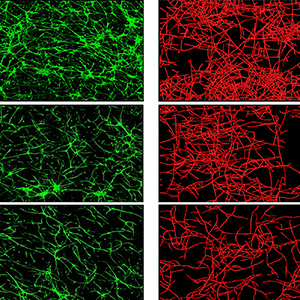
University of Utah bioengineers showed that tiny blood vessels grow better in the laboratory if the tissue surrounding them is less dense. Then the researchers created a computer simulation to predict such growth accurately – an early step toward treatments to provide blood supply to tissues damaged by diabetes and heart attacks and to skin grafts and implanted ligaments and tendons.
“Better understanding of the processes that regulate the growth of blood vessels puts us in a position ultimately to develop new treatments for diseases related to blood vessel growth,” and to better understand cancer metastasis, says bioengineering professor Jeff Weiss of the university’s Scientific Computing and Imaging Institute.
Weiss and Lowell Edgar, a postdoctoral fellow in bioengineering, published their study Wednesday, Jan. 22, in the Public Library of Science’s online journal PLOS ONE.